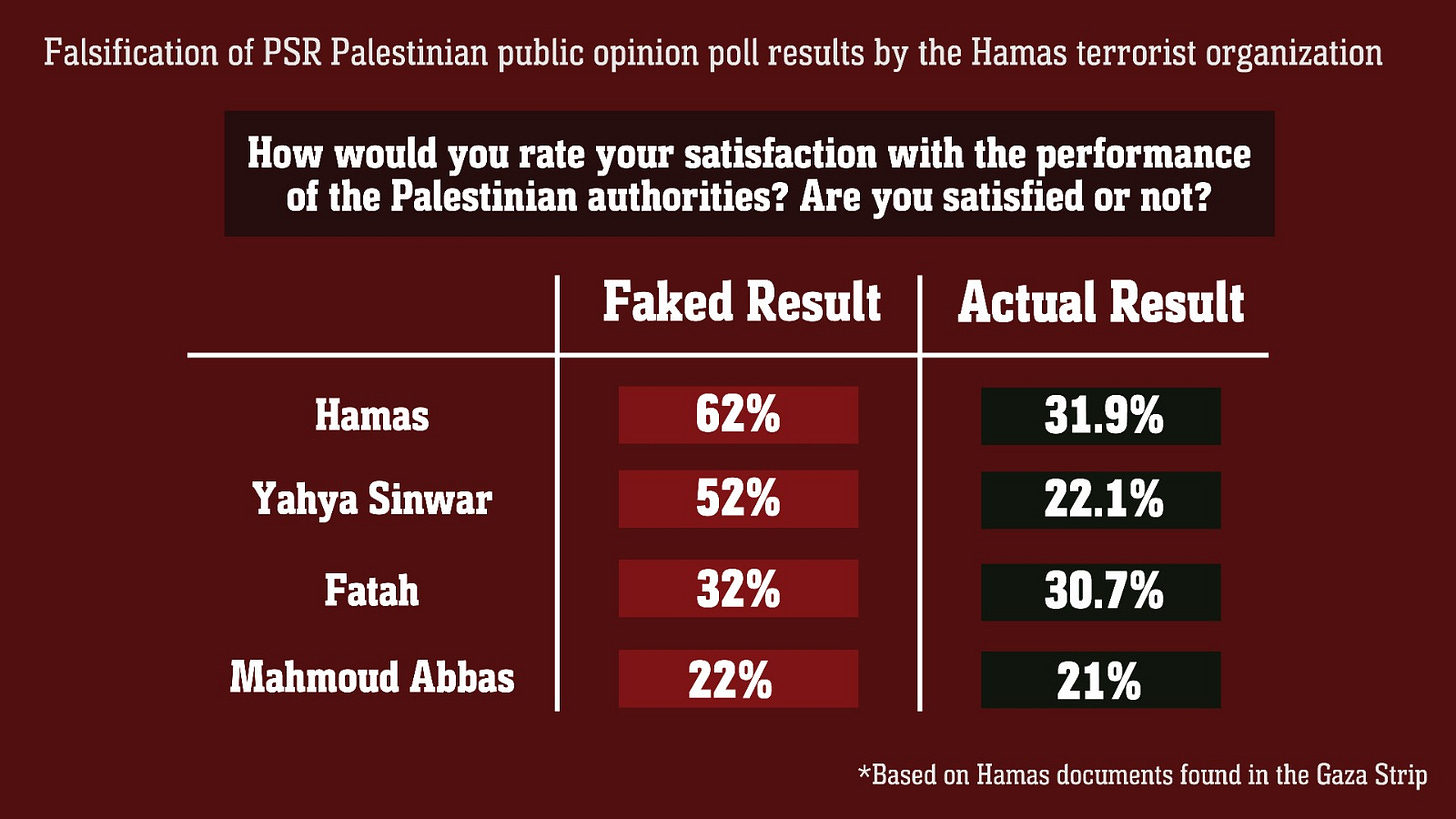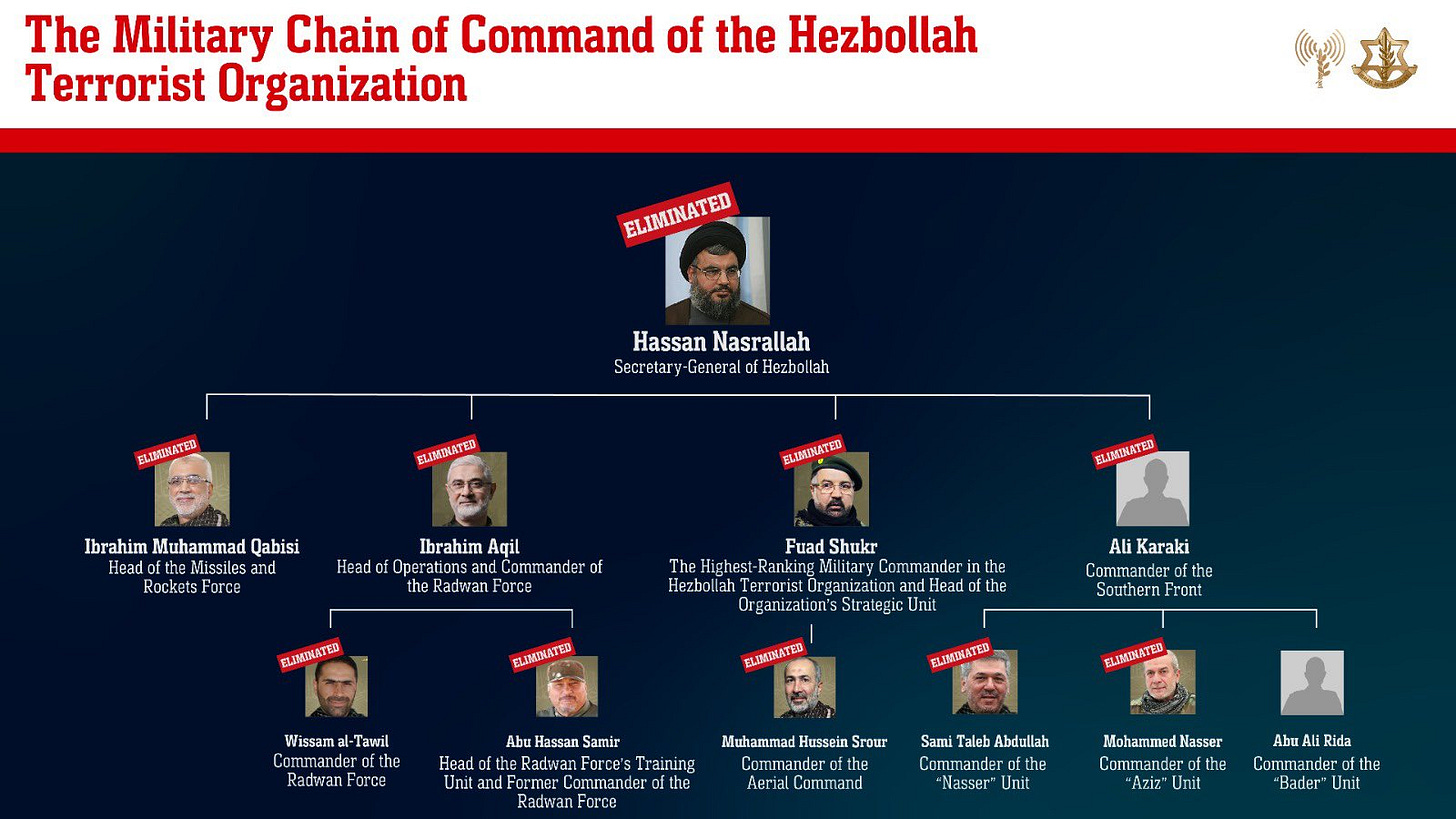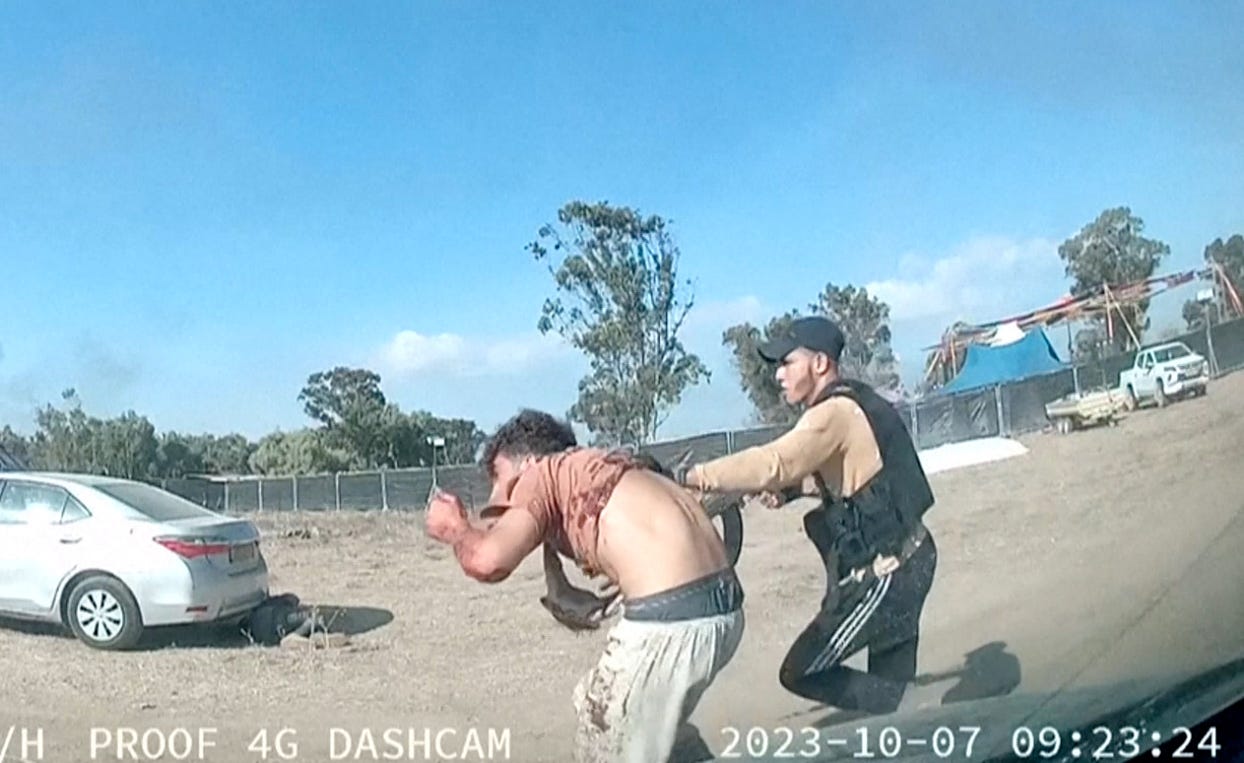When a Terror Group’s Brutality Backfires
Their brutality is not a display of strength, but a sign of growing desperation, humanitarian bankruptcy, and profound ignorance of the civilized world's resilience and unity.
Please consider supporting our mission to help everyone better understand and become smarter about the Jewish world. A gift of any amount helps keep our platform free of advertising and accessible to all.
You can also listen to the podcast version of this essay on Apple Podcasts, YouTube Music, YouTube, and Spotify.
The reign of barbaric terror demonstrated by the Islamic State (ISIS) in the Middle East was marked by unparalleled cruelty including mass murder, enslavement, torture, and systemic sexual exploitation of women and children.
Just this week, Israel led the rescue of a 21-year-old Yazidi woman who was kidnapped from Iraq by ISIS in 2014 at age 11 and trafficked to the Gaza Strip.
Terrorist organizations like ISIS aim to instill fear so profound, that resistance would be futile. But thankfully (though it is bizarre to say), their extreme brutality led to the formation of international coalitions aimed at their annihilation. The local populations, once too terrified to act, joined forces with these coalitions, providing intelligence, support, and combatants. ISIS’s brutality became their Achilles’ heel, exposing them to relentless attacks and ultimately contributing to their downfall.
Similarly, Boko Haram in Nigeria has faced fierce resistance from local vigilante groups and the Nigerian military. The group’s indiscriminate killing and abduction campaigns, particularly the kidnapping of schoolgirls, outraged the world and stiffened local resolve. Their brutality did not just shock the conscience; it forged a united front determined to eradicate them.
Hamas, Palestinian Islamic Jihad, and Hezbollah have followed suit, and if the Iranian regime has half a brain, they would be wise to dial back their pernicious pursuit of Islamist hegemony before their brutality inevitably backfires as well.
In Gaza, Hamas’ violent takeover of the Strip in 2007 exhibited all the classical signs of a barbaric terror group. It ruthlessly suppresses political dissent within the enclave by arresting, torturing and, in some cases, executing rivals. Hamas operatives, as a matter of policy, use the Gazan population as human shields, hiding behind women and children and embedding assets within schools, mosques, hospitals, medical facilities, and other civilian infrastructure.
The terror group has also carried out public executions of individuals accused of homosexuality, collaborating against Hamas, and exhibiting liberal social norms — a horrifying demonstration to other locals that if they do not obey Hamas’ wicked regime, they too will suffer a similar fate.
The everyday Gazan is heavily dependent on foreign aid, with Qatar topping the list of donors. The Gulf monarchy is estimated to have contributed over $1.5 billion during the past decade, although the money has mainly been disbursed as stipends for public officials and poor families (Hamas bribes, in other words) rather than to develop and stimulate the local economy. It is also very likely that Hamas commingles these and other so-called humanitarian funds.
To add insult to injury, the terror group uses (and loses) hundreds of Palestinian children each year digging underground tunnels. In addition to taking a massive cut of all goods entering Gaza, Hamas limits their flow to keep the population angry and dependent. And sometimes, to make a point, Hamas blows up the pipes that bring fuel into the Strip and bombs the border crossings through which aid and aid workers pass.
Despite all of the death, pain, and misery that Hamas has inflicted on the Gazan population, many thought that it had remained exceedingly popular among the people. Not so.
About a month ago, the IDF released Hamas documents, seized in the Strip, that showed the terrorist organization secretly falsified its levels of public support in polls conducted by the West Bank-based Palestinian Center for Policy and Survey Research.
One document, under “corrected result” — the figure that was published — gave Hamas’ approval rating in Gaza as 62 percent, compared with what was termed the “actual result” of 31.9 percent. Hamas leader Yahya Sinwar’s “corrected” approval rating was 52 percent, up from 22.1 percent “actual” support. And there was a 71 percent “corrected” approval rating for the October 7th onslaught, up from an “actual” 30.7 percent.

Even though it has shaken many of us to our cores, Hamas’ brutality has also had a “positive” influence on Jews both in Israel and across the world, as well as Arab Israelis. Many secular, leftist Jewish Israelis have, since October 7th, tapped far more into their previously diminished or nonexistent Zionism and Judaism, which strengthens the Jewish state and Jewish People.
And many Arab Israelis have woken up to the fact that, while living in Israel is nowhere near ideal for some of them, it is worlds better than living anywhere else in the Middle East, especially in the many places frequented by jihadist terrorists.
Meanwhile, many Jews in the Diaspora have also tapped far more into their previously diminished or nonexistent Zionism and Judaism; many non-Jews have come to develop new and deeper relationships with Jews and Jewish communities as a direct result of October 7th; and the Jewish Agency for Israel, which handles Jewish immigration for the Israeli government, expects 15,500 new immigrants from Western countries to arrive in the Jewish state this year — nearly 2.5 times more than in 2023.1
In Lebanon, Hezbollah has been reeling at a rate that even surprises the average Israeli. We always knew Israel has some of world’s greatest defense, security, and intelligence, but we also knew, since the last war with Hezbollah in 2006, the Iran-backed terror group had amassed a massive arsenal equivalent to that of a midsize European power, not to mention 100,000 fighters (three to four times more than Hamas) as well as secret services that have been described as “one of the best in the world.”
On October 8th, 2023, just one day after the unforgettable Hamas-led massacres and kidnappings in Israel, Hezbollah joined the war unprovoked “in support of Gaza” — and one of the reasons that Israel did not respond to Hezbollah with more force at the outset is because the Israelis understandably preferred only one major front over two.
While Hezbollah’s daily attacks on northern Israel quickly became more and more frustrating, particularly for the millions of residents there, delaying a real fight with Hezbollah proved to be the right calculus. Meanwhile, longtime Hezbollah leader Hassan Nasrallah, a vile antisemite who has previously chirped about “the disappearance of Israel” and his desire for all the Jews “to gather in Israel” in order to “save us the trouble of going after them worldwide,” was adamant that Hezbollah would only accept a ceasefire in the current conflict when one is reached in Gaza.
The U.S. and France frantically tried to convince Nasrallah otherwise, until the Israelis finally “took the gloves off” — significantly injuring at least 3,000 of his operatives by ingeniously detonating their pagers and walkie-talkies last month. The signal that blew up thousands of Hezbollah pagers was an encrypted message which required these terrorists to hold the devices with both hands, maximizing the chances of causing debilitating injuries.2
Following the attack, Israeli Prime Minister Benjamin Netanyahu joked that this Mossad operation was so successful, it was only a matter of time before they eliminated Nasrallah (who, fearing Israeli reprisal, has not given a public speech since the 2006 Israel-Hezbollah war).
Turns out, that was not a joke. Israel assassinated Nasrallah a few days later, followed by his replacement and the replacement of his replacement. All in all, Israel has taken out virtually the entire senior leadership of Hezbollah in a few weeks’ time.

On Wednesday, IDF Chief of Staff Herzi Halevi said Hezbollah is trying to hide its losses amid intensive fighting and Israeli airstrikes in Lebanon. According to Halevi, the terror group “is experiencing control and command difficulties, leading to confusion at the decision-making level and challenges in its ability to function,” adding that “even in Iran they still don’t realize the full damage to the front they built along the northern border.”
Now, Hezbollah officials are terrified of tapping a new leader and, as of this week, they are no longer demanding a truce in Gaza as a condition for reaching a ceasefire in Lebanon, rescinding the oft-repeated pledge to continue fighting until Israel halts its offensive against Hezbollah’s Iran-backed ally Hamas.
Sooner rather than later, Hezbollah might very well be negotiating its way out of Lebanon as well, similar to the Palestine Liberation Organization’s fate in the 1980s, when Israel pushed them out of their Lebanese headquarters and into Tunisian exile.
Like Hamas in Gaza, Hezbollah has tried to overtake Lebanon politically. Their 1985 manifesto featured the expulsion of Western influences from Lebanon, allegiance to the Islamic Republic of Iran’s supreme leader, and the establishment of an Iran-influenced Islamist government.
During the 2022 Lebanese elections, Hezbollah supporters won 60 seats, including 13 held by Hezbollah itself. Nearly half of these delegates are under the terror group’s control, and two ministers serve on its behalf in the Lebanese government. As such, Hezbollah has been described as a “state within a state.”
Back in 2008, tensions between Hezbollah and the Lebanese government escalated into armed conflict in Beirut. Hezbollah fighters overtook areas in the capital city, attacking offices of political rivals and killing dozens of people. This show of force was a clear message to other political factions about Hezbollah’s willingness to use violence to maintain its influence. Detainees, including political opponents and suspected collaborators, have reported being subjected to severe beatings, electric shocks, and other forms of torture.
Hezbollah has also been implicated in the assassinations of political figures and journalists critical of the terror group, one of the most notable cases being the assassination of former Lebanese Prime Minister Rafik Hariri in 2005.
What’s more, Hezbollah’s involvement in the Syrian Civil War, fighting in favor of the nefarious Assad regime, has had significant repercussions in Lebanon. Many Lebanese have opposed Hezbollah’s role in the conflict, seeing it as dragging Lebanon into a foreign war. Plus, the return of battle-hardened fighters and the influx of refugees have strained Lebanon’s resources and exacerbated sectarian tensions.
And, for more than a decade, Hezbollah has approached poor Shiite families in Lebanon with a tempting offer for a fixed rental fee: Allocate a room in your home for a long-range missile, with a heavy warhead, that will be ready to launch at Israel within minutes.3 The families, which serve as a human shield and camouflage, are specifically chosen for how poor and in desperate need of additional income they are.
In summary, terror groups bank on one primary currency: manipulative, unabated fear. They believe that by inflicting unimaginable horrors, they can cow populations and governments into submission. They see themselves as the ultimate puppeteers, yanking the strings of terror to orchestrate a symphony of despair. But history teaches a harsh lesson: Push people too far, and fear transforms into fury.
These groups often fall victim to what can be termed the Icarus Syndrome: They fly high on the wings of their viciousness, deluded into thinking they are invincible. Their heinous acts, intended to showcase strength, reveal their true nature: weak cowards hiding behind masks of violence. Every beheading, every bombing, every act of barbarism is a desperate cry for relevance in a world that increasingly rejects their medieval savagery.
They try to fight back, harder and fiercer, united by their deranged ideology and misguided hatred — but the terrorists, once the hunters, become the hunted. When civilians are caught in the crossfire, when innocents are slaughtered en masse, the collective consciousness shifts. The oppressed no longer see these terrorists as invincible monsters but as rabid dogs needing to be put down.
In their delusion, terror groups fail to see that the seeds of their destruction are sown by their own hands. Their brutality is not a display of strength, but a sign of growing desperation and humanitarian bankruptcy. They believe they are invincible, yet their actions reveal their profound ignorance of the civilized world’s resilience and unity.
When a terror group’s brutality backfires, it is not just poetic justice. It is the inevitable consequence of underestimating the indomitable spirit of the human soul. People will endure a lot, but there is a line. Once crossed, no amount of fear can contain the tidal wave of retaliation. Terrorists may think they are gods of fear, but in reality, they are nothing more than catalysts of their own destruction.
Of course, much of the world will continue to chastise Israel for granting these terrorists their explicitly stated death wish, but one day history books will surely show that the Israelis did a right thing by offering no inkling of mercy to these despicable souls.
“Russian immigration streams in as Israel predicts uptick in Western newcomers.” Times of Israel.
“Mossad’s pager operation: Inside Israel’s penetration of Hezbollah.” The Washington Post.
“"הדייר" הסמוי בבית המשפחות השיעיות בלבנון: הפרויקט של חיזבאללה שצה"ל החל לסכל.” Ynet News.



Precisely! Seems to me, wherever Palestinians go, destruction follows, as evidenced in Paraguay along the Brazilian border! There used to be a vibrant commercial district and Jewish community until the Palestinians came and drove the Jews out, turning the entire region into a violent criminal enterprise led by car, drug and smuggling of any kind, racketeering, extortion, threat and use of violence, you name it! Pretty much any evil you can imagine, the Palestinians brought it with them, proving that they are in fact incapable of self-governance!
What’s a brilliant scenario of the many and evil terror groups that plague the world. It is utterly evil and the eternal mystery is the fact that the West fights against this perception. I find this anathema! Is it cowardice, fear, woke ignorance or what else? The west is condemning itself to occupation and a loss to our civilisation! I see Israel’s fight as our salvation, many others who are not Jewish, share this view passionately! The west needs to shove its ignorance off the face of the earth. As always, I stand with Isreal!